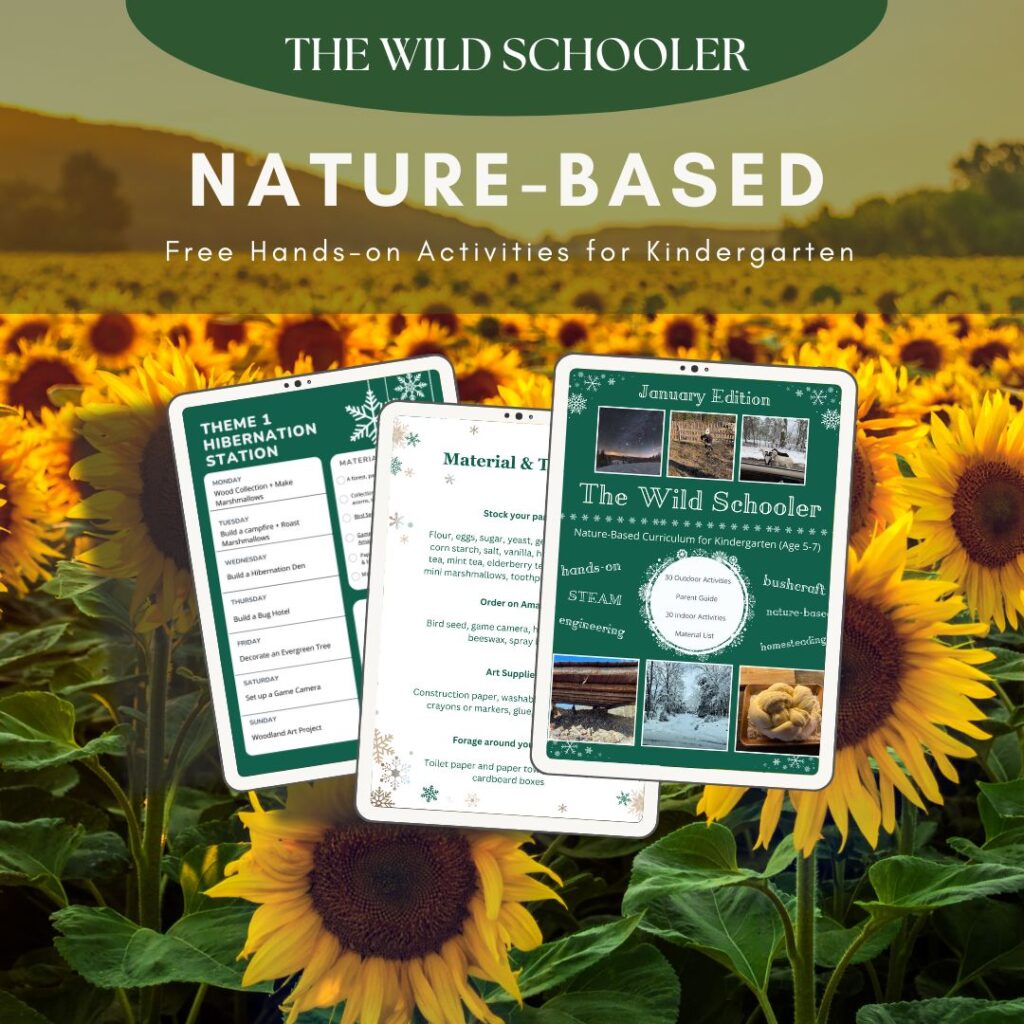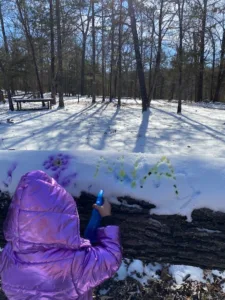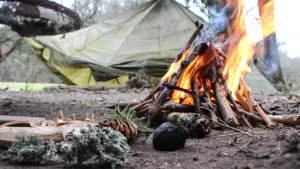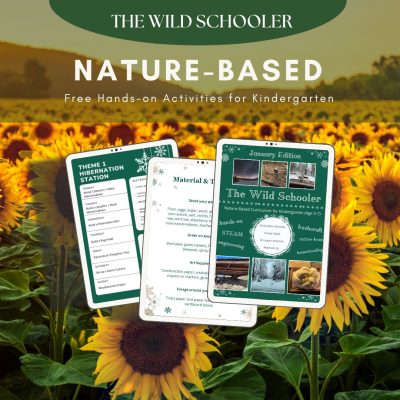There’s a growing movement is taking root, quite literally, as children and educators step out of traditional classrooms and into the enchanting world of Forest Schools. As urbanization and screen time become ubiquitous, the call for reconnecting with nature is louder than ever. But what is a forest school?
The forest school approach offers a refreshing alternative to traditional school, where children learn in outdoor classrooms and teachers/parents embrace nature as an immersive learning experience.
Looking for inspiration for your own forest school? Read 27 Quotes About Children and Nature That Will Inspire You to Start a Forest School.
The Rise of Forest Schools:
Recently, Forest Schools have gained momentum, capturing the imagination of parents, educators, and young children. Originating from Scandinavian countries, where outdoor education is deeply ingrained in the culture, Forest Schools have become a global phenomenon, finding resonance in diverse landscapes from North America to Europe and beyond.
Learning Unleashed in Nature’s Classroom:
What sets Forest Schools apart is their unique approach to education—one that embraces the natural world as a dynamic and immersive classroom. Unlike traditional settings, Forest Schools bring learning beyond four walls, allowing children to explore, discover, and connect via hands-on experiences with the environment around them. While forest schools are primarily let by teachers and programs that you sign up for, homeschooling parents are also using these nature-based methods and creating wild schools at home. Learn more about what wild schooling is here.
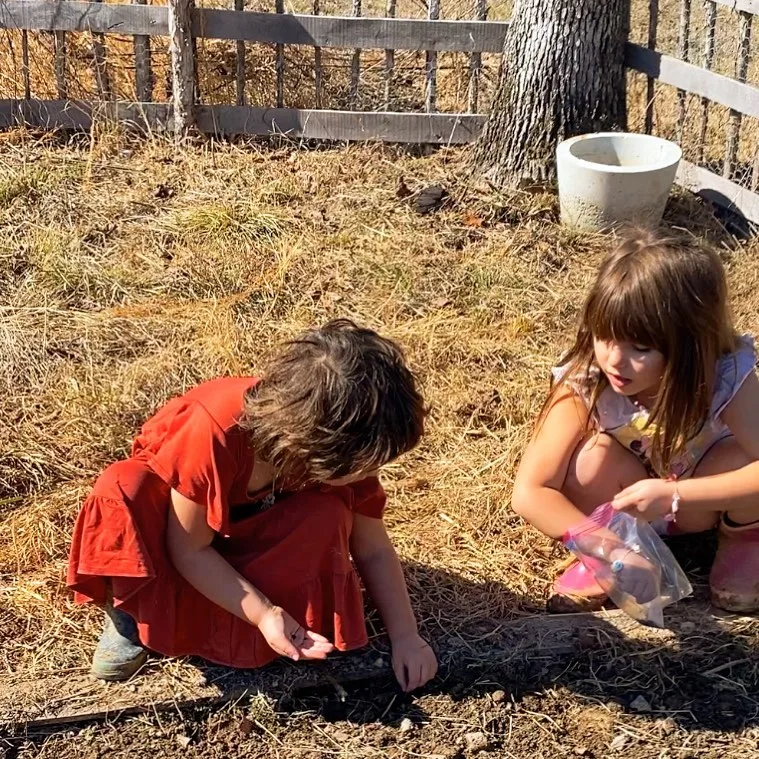
In this exploration of Forest Schools, we discuss the core principles, activities, and benefits that make this educational philosophy a beacon of holistic learning. Join us on a journey through the foliage as we uncover the secrets of Forest Schools and celebrate the boundless possibilities that nature offers in nurturing young people.
What is a Forest School?
A Forest School or Forest Kindergarten is an innovative educational approach that places nature at the forefront of learning. Unlike traditional primary schools, Forest Schools immerse children in outdoor environments, fostering a deep connection to the natural world. In a Forest School, the journey of education unfolds beneath the canopy of trees, with the environment itself becoming a teacher, mentor, and playground.
Where Was the First Forest School?
The roots of the Forest School movement dig deep into the soils of Scandinavia, where the concept first took shape in the early 20th century. In Denmark, for instance, educators observed that children who spent more time outdoors displayed not only a profound understanding of the environment but also enhanced resilience, creativity, and problem-solving skills. Inspired by these observations, the Forest School philosophy emerged, emphasizing the vast potential of learning in a natural setting.
Key Principles of Forest Education:

Child-Led Learning:
At the heart of the Forest School philosophy is the belief in child-led learning. Children are encouraged to take the reins of their educational journey, exploring their interests and curiosities at their own pace.
Holistic Development:
Forest Schools prioritize the holistic development of a child—mind, body, and soul. The outdoor environment becomes a canvas for honing physical abilities, fostering emotional well-being, and nurturing a deep sense of environmental stewardship.
Experiential Learning:
Learning in a Forest School is hands-on and experiential. Instead of textbooks, children engage with natural materials, conducting experiments, solving real-world problems, and immersing themselves in green spaces.
Nature Immersion:
The philosophy underscores the importance of nature immersion for comprehensive learning. Whether it’s identifying flora and fauna, navigating natural landscapes, or simply enjoying unstructured play, every aspect of the Forest School experience is intertwined with the natural environment.
Not All Classrooms Have Four Walls
In Forest Schools, nature is not just a classroom setting; it’s an active participant in the learning process. The great outdoors becomes a living, breathing classroom that enriches the educational experience in ways traditional settings cannot emulate.
Benefits of Learning in a Forest School
Improved Physical Health:
Spending time in natural settings encourages physical activity, promoting robust health and well-being. Whether climbing trees, hiking trails, or engaging in outdoor games, children in Forest Schools develop strength, coordination, and a love for outdoor play.
Enhanced Cognitive Skills:
Nature stimulates cognitive development, fostering curiosity, problem-solving, and critical thinking. The complex and ever-changing natural environment provides a rich tapestry for developing observational skills, pattern recognition, and a deeper understanding of ecological systems.
Emotional Development:
The serene and nurturing atmosphere of nature has a positive impact on emotional well-being. Forest Schools provide a supportive space for children to build resilience, develop a sense of autonomy, and cultivate emotional intelligence through their interactions with the natural world.
Immersive Learning Experiences
In Forest Schools, learning is not a passive endeavor but an active, hands-on exploration of the world. Outdoor activities are carefully designed to harness the educational potential of the natural environment, fostering a sense of wonder and curiosity. Here are some examples:
- Nature Walks:
Guided walks through the forest provide opportunities for observation, exploration, and discovery. Children engage with the flora and fauna, developing an appreciation for the biodiversity in their surroundings. - Wildlife Observation:
Forest Schools offer a front-row seat to the wonders of the natural world. Whether tracking animal footprints, identifying birds, or observing insects, children deepen their understanding of ecosystems and the interconnectedness of all living things. - Plant Identification:
Learning about plants becomes a tangible experience as children identify, touch, and observe various plant species. This hands-on approach enhances botanical knowledge and ecological awareness. - Team-Building Exercises:
Collaborative activities in Forest Schools promote teamwork, communication, and problem-solving. From building shelters to navigating terrain, these exercises not only enhance practical skills but also build positive relationships with peers.
Hands-On and Experiential Learning
The hallmark of Forest School activities is their hands-on and experiential nature. Instead of reading about the natural world, children directly interact with it, fostering a deeper connection to their environment and a lasting love for learning.
As we journey deeper into the Forest School experience, we’ll uncover more activities and delve into the transformative impact they have on the educational landscape. Join us as we explore the dynamic interplay between nature and learning, unlocking the potential for growth, discovery, and joy in the great outdoors.
The Facilitators of Nature’s Classroom
In a Forest School, educators transform into facilitators or coaches, guiding children through the wonders of the natural world. Their role goes beyond traditional teaching; they become orchestrators of curiosity, nurturers of exploration, and mentors in the art of learning through nature.
Qualities of a Forest School Educator:
- Adaptability: Forest School educators embrace the unpredictability of nature. From sudden weather changes to unexpected wildlife encounters, adaptability is a key quality. The ability to adjust lesson plans on the fly and capitalize on teachable moments is central to the Forest School ethos.
- Environmental Knowledge: A deep understanding of the natural world is a cornerstone for Forest School educators. They not only possess scientific knowledge but also weave ecological concepts seamlessly into the fabric of everyday learning. This environmental literacy enhances the educational experience, providing context and relevance to lessons.
- Passion for Outdoor Education: At the heart of every Forest School educator is a fervent passion for outdoor education. This enthusiasm is contagious, inspiring children to view the natural world with awe and excitement. The outdoors become a canvas for learning, and the Forest School educator is the artist, crafting experiences that leave a lasting impact.
A Global Tapestry of Outdoor Learning
The Forest School movement has transcended geographical boundaries, taking root in diverse landscapes worldwide. Here are examples of successful Forest School programs that showcase the adaptability of this educational philosophy:
- Scandinavia: The birthplace of the Forest School movement, Scandinavia boasts numerous successful programs. Countries like Denmark, Sweden, and Norway integrate Forest Schools into mainstream education, recognizing the holistic benefits of learning in nature.
- United Kingdom: Forest Schools have flourished in the UK, where the movement has gained widespread acceptance. The Forest School Association, founded in the UK, has been instrumental in promoting and supporting Forest Schools across the country.
- United States: From the Pacific Northwest to the New England woods, Forest Schools have sprouted across the United States. Programs vary in size and structure, adapting to the diverse ecosystems that characterize this vast and geographically varied nation.
Cultural Adaptations
One of the strengths of the Forest School concept lies in its adaptability to different cultures. Around the world, educators are tailoring the Scandinavian approach to suit local environments and traditions. In Japan, for example, the concept of “forest bathing” aligns with Forest School principles, promoting wellness through immersion in nature. Similarly, in Australia, Indigenous perspectives on the land are seamlessly integrated into Forest School practices.
As we traverse the global landscape of Forest Schools, we witness a harmonious blend of nature and education, where cultural diversity enriches the learning experience. Join us as we explore the far-reaching impact of Forest Schools and the myriad ways in which they continue to blossom on a global scale.
Why a Forest School Education is Better
The benefits of Forest Schools extend far beyond the classroom, weaving a tapestry of growth, development, and lifelong appreciation for the natural world.
- Increased Confidence: Nature, with its ever-changing challenges, becomes a playground for building confidence. Through activities like climbing trees, navigating trails, and overcoming outdoor obstacles, children develop resilience and a sense of self-assurance.
- Improved Social Skills: Forest Schools cultivate a sense of community and cooperation. Group activities, teamwork, and shared outdoor experiences foster strong social bonds, enhancing communication skills and promoting empathy among children. More emphasis is placed on teamwork and working together, as opposed to grades and competition that you find in traditional public schools.
- Lifelong Appreciation for Nature: Perhaps the most enduring benefit is the cultivation of a lifelong love for nature. Exposure to the outdoors from a young age creates a foundation for environmental stewardship, instilling a deep-seated appreciation for the wonders of the natural world.
Research Supporting Outdoor Education:
A growing body of research supports the positive outcomes of outdoor education, especially in the context of Forest Schools. Studies indicate improvements in physical health, enhanced cognitive abilities, and increased emotional well-being among children engaged in outdoor learning environments. These findings underscore the holistic benefits of Forest Schools, providing empirical evidence for the transformative impact of nature on education.
Embracing Nature’s Uncertainties
While outdoor schools offer a wealth of benefits, they are not without challenges. Addressing these challenges head-on is crucial for the successful implementation of outdoor education.
- Weather Concerns: Unpredictable weather can pose a challenge. However, by incorporating appropriate clothing, shelter options, and adapting activities to different conditions, educators can turn weather challenges into valuable learning experiences.
- Safety Issues: Ensuring the safety of children in outdoor settings is a top priority. Forest School programs implement thorough risk assessments, establish clear safety guidelines, and provide proper training for educators to create a secure learning environment.
Solutions and Best Practices:
- Weather Preparedness: Equip children with weather-appropriate clothing, including waterproof gear. Have contingency plans for extreme weather conditions and flexible activity options that can be adapted based on the day’s forecast.
- Safety Protocols: Implement robust safety protocols, including comprehensive risk assessments for outdoor spaces. Ensure that educators are well-trained in outdoor safety and first aid. Regularly review and update safety procedures to align with changing conditions.
Embarking on the Forest School Journey:
For those inspired to embark on the Forest School journey, numerous avenues exist to get involved.
- For Parents: Seek out local Forest School programs or nature preschools in your area. Engage with the Forest School community through facebook groups, Instagram accounts of local Forest Schools, or local events (try-out day) to connect with like-minded parents and educators.
- For Educators: Explore training programs and certifications specifically designed for outdoor education and Forest School practices. Organizations like the Forest School Association and local environmental education groups often offer training courses to equip educators with the skills needed to start and run a forest school.
- Resources and Organizations:
We hope you enjoyed learning more about Forest Schools and will consider getting involved by launching your own or joining one nearby. The Forest School journey is not just an educational approach; it’s an invitation to cultivate a generation that thrives in harmony with nature, fostering confident, socially adept, and nature-loving individuals. Join us in unlocking the potential of nature’s classroom and redefining the future of education.

